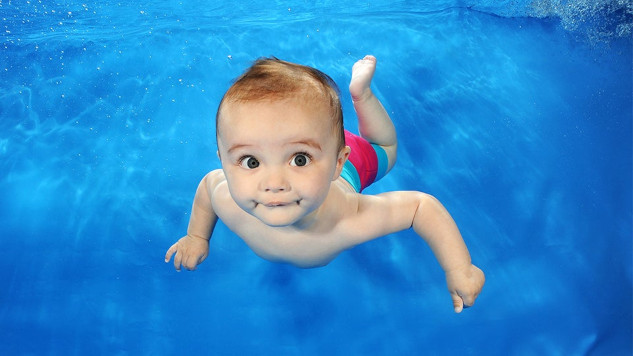
In this Article:
- What are the risks of swimming with open eyes underwater?
- How do chlorine and saltwater affect your eye health?
- Can swimming underwater cause eye infections or irritation?
- What precautions should you take to protect your eyes while swimming?
- When should you seek medical advice for eye issues after swimming?
Risks of Swimming Underwater with Open Eyes Explained
by Gunnar Schmidtmann, University of Plymouth
If you’ve ever swam underwater with your eyes open, you have noticed that your eyes sting a bit afterwards. Unlike many animals, we don’t have a third eyelid to protect our eyes underwater, but does that mean we shouldn’t swim with our eyes open?
Fortunately, swimming with open eyes is generally not dangerous. However, certain factors must be considered to ensure your safety and comfort.
The stinging or gritty sensation of the eyes is caused by the highly sensitive translucent conjunctiva that covers the white bit and the inner lids of our eyes.
This sensation can be caused by various irritants, depending on the environment. For instance, most public swimming pools contain chlorinated water. Water, including swimming pool water, would be an ideal environment for numerous, potentially harmful microbes, such as bacteria and fungi.
Chlorine or chlorine compounds have antimicrobial properties. These chemicals are commonly added to the water as a disinfectant to minimise the number of harmful microbes and to prevent the spread of infectious waterborne diseases. Prolonged exposure to these substances or their byproducts can in some people lead to irritations and sometimes lead to more serious conditions like conjunctivitis – commonly known as pink eye.
Conjunctivitis is an inflammation of the conjunctiva caused by either a bacterial, viral or, occasionally, fungal infection. One sign of inflammation is the redness, caused by an increased blood vessel diameter and hence increased blood flow initiated by the immune system to fight the infection. This causes the pinkish, reddish discolouration.
Another sign of inflammation is pain, which is often felt as a stinging sensation or grittiness. Conjunctivitis usually clears up on its own. The most common viral conjunctivitis usually does not require any treatment and typically resolves in one to two weeks. Antibiotic eye drops might be required in the case of bacterial infections.
Frequent swimming can also cause changes in the tear film and lead to a condition called dry eye, which is characterised by a gritty sensation or blurred vision.
Salt water
But what about swimming in salt-water pools or the oceans?
Salt water is less likely to irritate compared with chlorinated water, but it can still be uncomfortable for swimmers. The relatively high concentration of salt content in seawater can make eyes feel dry and gritty, but it is generally of no concern unless the water quality is poor.
Poor water quality in the sea, but also rivers and lakes increases the risk of eye infections and other health issues.
Swimming with open eyes is unlikely to cause serious harm, but it is always advisable to take precautions to maintain eye health and prevent discomfort. Using swimming goggles can protect your eyes from chemicals, salt and potentially harmful microbes, providing a barrier and allowing you to see clearly underwater.
Rinsing your eyes with clean water or saline solution can help remove any irritants. Good eyelid hygiene is also recommended.
It is important to avoid swimming in polluted water. Steer clear of water that looks dirty, smells bad, or is known to have high levels of bacteria or pollution. Finally, if you experience prolonged redness, pain, or vision changes after swimming, seek medical advice.![]()
Gunnar Schmidtmann, Associate Professor of Optometry and Vision Science, University of Plymouth
Article Recap:
Swimming with your eyes open underwater can expose your eyes to irritants like chlorine, salt, and potentially harmful microbes. While it’s generally safe, these exposures may cause discomfort or even lead to infections such as conjunctivitis. Protecting your eyes with swimming goggles, rinsing your eyes with clean water after swimming, and avoiding polluted waters are key measures to maintain eye health. Learn how to keep your eyes safe while enjoying time in the water.
This article is republished from The Conversation under a Creative Commons license. Read the original article.
Related Books:
The Body Keeps the Score: Brain Mind and Body in the Healing of Trauma
by Bessel van der Kolk
This book explores the connections between trauma and physical and mental health, offering insights and strategies for healing and recovery.
Click for more info or to order
Breath: The New Science of a Lost Art
by James Nestor
This book explores the science and practice of breathing, offering insights and techniques for improving physical and mental health.
Click for more info or to order
The Plant Paradox: The Hidden Dangers in "Healthy" Foods That Cause Disease and Weight Gain
by Steven R. Gundry
This book explores the links between diet, health, and disease, offering insights and strategies for improving overall health and wellness.
Click for more info or to order
The Immunity Code: The New Paradigm for Real Health and Radical Anti-Aging
by Joel Greene
This book offers a new perspective on health and immunity, drawing on principles of epigenetics and offering insights and strategies for optimizing health and aging.
Click for more info or to order
The Complete Guide to Fasting: Heal Your Body Through Intermittent, Alternate-Day, and Extended Fasting
by Dr. Jason Fung and Jimmy Moore
This book explores the science and practice of fasting offering insights and strategies for improving overall health and wellness.

























